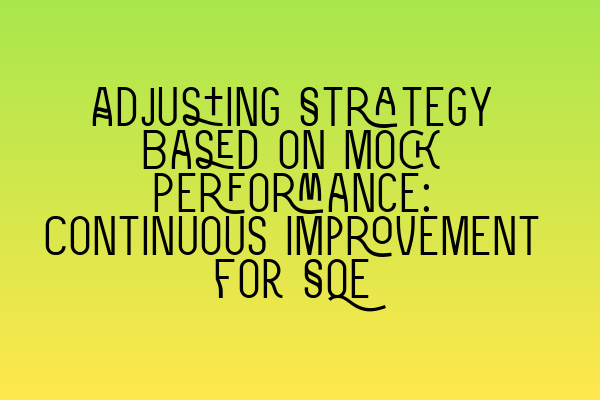Adjusting Strategy Based on Mock Performance: Continuous Improvement for SQE
As aspiring solicitors prepare for the Solicitors Qualifying Examination (SQE), it is crucial to have a well-defined study strategy. Mock exams play an integral role in identifying areas of improvement and refining your approach. In this blog post, we will explore the significance of adjusting your strategy based on mock performance and discuss how continuous improvement can enhance your chances of success in the SQE.
Before we delve into the details, let’s establish the importance of continuous improvement. The legal profession is highly competitive, and staying ahead requires an adaptive mindset. A static study plan or revision strategy may not yield optimal results. By continuously evaluating your performance and adjusting your approach, you can overcome weaknesses and enhance your strengths, ultimately maximizing your chances of excelling in the SQE.
Mock exams serve as powerful tools for self-assessment. They simulate the real exam environment, providing you with an opportunity to gauge your knowledge and skills. It is essential to treat mock exams with the same seriousness as the actual SQE. With each mock exam, you can identify areas where you may be struggling and areas where you excel.
Analyzing your mock exam performance requires a systematic approach. Start by reviewing the questions you answered incorrectly or struggled with. Identify the key areas of law or legal concepts that you need to strengthen. These areas could include subjects like tenant rights, land law, residential leases, or lease laws in the UK.
To further enhance your understanding of these subjects, it is beneficial to explore related articles. For example, understanding tenant rights in the UK is essential for comprehending legal protections. You can find detailed insights on this matter in the article entitled “Tenant Rights in the UK: Understanding Your Legal Protections.” Similarly, “Examining the Intricacies of Land Law in the UK” provides valuable information on land law, while “Legal Considerations in Residential Leases: Essential Insights for Solicitors” offers essential considerations for solicitors in lease-related cases. Additionally, “Workshops on Land Law: Interactive Learning for Aspiring Property Law Professionals” can provide interactive learning opportunities, allowing you to grasp complex land law concepts effectively. Lastly, “Lease Laws in the UK: Unraveling the Legal Framework for Tenants” unravels the legal framework for tenants, providing a comprehensive overview of lease laws in the UK.
By incorporating learnings from these related articles, you can enhance your understanding of the subjects, address any knowledge gaps, and refine your study strategy accordingly. Continuous improvement requires adaptability, and the ability to incorporate relevant information from trusted sources is crucial.
Alongside content-specific improvements, it is equally essential to evaluate your exam-taking strategies. Review your time management skills during mock exams. Identify if you tend to spend too much time on certain questions, leaving insufficient time for others. Practice managing your time effectively to ensure you can complete all sections of the exam within the allocated timeframe.
Another vital aspect to consider is how you approach complex, scenario-based questions. These questions require critical analysis and thoughtful reasoning. Assess whether you are effectively identifying the key issues and providing comprehensive answers. Refining your approach to such questions can significantly impact your overall performance.
Additionally, pay attention to the feedback provided on your mock exams. Analyze the comments and suggestions offered by professionals or experienced tutors. Their insights can help you identify common mistakes, improve your writing skills, and enhance your overall approach to answering exam questions.
In conclusion, adjusting your strategy based on mock performance is a crucial aspect of continuous improvement in preparation for the SQE. By assessing your strengths and weaknesses, exploring relevant articles, and refining your study approach, you can maximize your chances of success in the examination. Stay motivated and committed to continuous improvement, and remember that each mock exam is an opportunity to learn and grow. Best of luck with your SQE preparation!

Leave a Reply